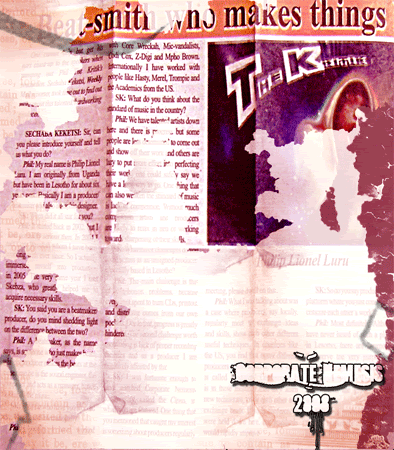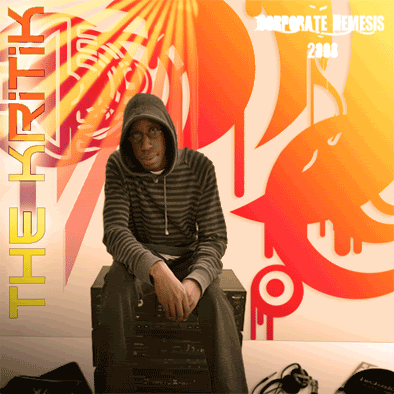What's good people??? Great! I thought I should share this great newspaper article on Phil the Kritik with you all. The interview was conducted by Sechaba Keketsi for The Weekly Mail. Read on...
To gain full access to the article, click here. Check out Phil's segment on The Cipha below. ONE!!
One cannot help but get their ears glued to the speakers when pumpin out Phil the Kritik's production. Sechaba Keketsi, Weekly Mail reporter, took time out to find out more about this talented, hardworking produer.
Sechaba Keketsi: Sir, can you please introduce yourself and tell us what you do?
Phil: My real name is Philip Lionel Luru. I am originally from Uganda, but have been in Lesotho for about six years now. Basically I am a produer/beatmaker, and also a graphic designer.
SK: When did it all start for you?
Phil: It started back in 2002, but I was not really serious then. In 2004 I met Core Wreckah, whom I have been working with ever since. So I actually immersed myself into production in 2005. The very same year I met Skebza, who greatly helped me to acquire necessary skills.
SK: You said you are a beatmaker/producer. Do you mind shedding light on the difference between the two?
Phil: A beatmaker, as the name says, is someone who just makes beats, while a producer makes the beats being the sound engineer, the composer, and manager. Hence, the producer shapes the music.
SK: Thus far, who have your worked with (locally and internationally) ?
Phil: Locally, I have worked with Core Wreckah, Mic Vandalists, Codi Cox, Z-Digi, and Mpho Brown (Poltergeist). Internationally I have worked with people like Hasty, Merel, Trompie, and the Academics from the US.
SK: What do you think about the standard of music in the country?
Phil: We have talented artists down here, and there is progress, but some people are less determined to come out and show off their work, while others are lazy to put more effort into perfecting their work. All in all, one could safely say that we have a long way to go. One thing that can also weaken the standard of music is lack of competition. Without much competition, artists and producers are likely to realax in lieu of working towards sharpening their skills.
SK: What major challenges do you come across as an unsigned producer, especially based in Lesotho?
Phil: The main challenge is that of distribution problems; every cent spent to burn CDs, print sleeves, and distribute the full product comes from my own pockets. Due to that, progress is greatly hindered. The second challenge worth mentioning is the lack of proper recording facilities. As a producer, I am negatively affected by that.
SK: I was fortunate enough to have watched Corporate Nemesis' documentary entitled "The Cipha" in which you feature. One thing that you mentioned that caught my interest is something about producers regularly meeting. Please clarify.
Phil: What I was talking about was a case where producers regularly meet to exchange ideas and skills, and show each other different useful techniques. In countries like the US, you find that many different producers come together to hold what is known as Producer's Conferences. It is in these meedtings that they learn new techniques, know each other, and exchange beats. If such conferences were held down here, our standards would rapidly improve...
To gain full access to the article, click here. Check out Phil's segment on The Cipha below. ONE!!
















No comments:
Post a Comment